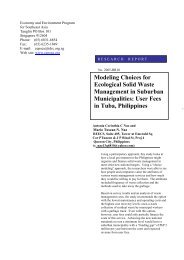systems research - the IDRC Digital Library - International ...
systems research - the IDRC Digital Library - International ...
systems research - the IDRC Digital Library - International ...
You also want an ePaper? Increase the reach of your titles
YUMPU automatically turns print PDFs into web optimized ePapers that Google loves.
Institutionalization is used in a broad sense to reflect <strong>the</strong> need for <strong>the</strong> creation of<br />
long-term programs on FSR ra<strong>the</strong>r than short-duration projects. The word<br />
institution in its sociological sense refers to <strong>the</strong> relationships between actors to<br />
achieve certain things.<br />
FSR means many things to many people. However, FSR claims and aims to<br />
serve <strong>the</strong> farmer through assistance in problem solving. Impacts are by definition<br />
location-specific; however, <strong>the</strong> justification for FSR is often couched in terms of<br />
contributing to <strong>the</strong> achievement of national goals. It is often said that FSR is a way<br />
to get <strong>research</strong>ers into <strong>the</strong> field or a way to get <strong>the</strong> <strong>research</strong>ers to reach senior<br />
officials. It is acce ted that FSR is adaptive in nature, yet it is recognized that <strong>the</strong><br />
adaptive nature o its organizational form and management is less strong.<br />
F<br />
The macro - micro context<br />
The major strength of FSR is that it gives priority to <strong>the</strong> farmer and seeks to help<br />
solve <strong>the</strong> problems encountered by farmers. It addresses area-specific problems, <strong>the</strong><br />
solutions for which cannot necessarily be applied to larger areas. Given <strong>the</strong> fact that<br />
FSR is practiced and funded in <strong>the</strong> context of national development plans and<br />
<strong>research</strong> and development programs, it is hardly surprising that <strong>the</strong> goals of FSR<br />
activities are fitted into national objectives. This may carry a contradiction between<br />
FSR, which focuses on individual problem solving, and national programs that seek<br />
to reach national targets.<br />
Most cbuntries represented at this workshop adhere to national self-<br />
sufficiency goals with regard to major staples (Indonesia, Thailand, Sri Lanka,<br />
Bangladesh, and <strong>the</strong> Philippines). As <strong>the</strong> majority of cases show, FSR activities<br />
fitted national goals to expand production of rice as well as individual goals of<br />
farmers, which could be stated as expansion of income. Therefore, <strong>the</strong> existence of<br />
national targets is not necessarily in contradiction with individual goals and <strong>the</strong><br />
derived goals of FSR. However, it remains questionable whe<strong>the</strong>r on-farm <strong>research</strong>,<br />
as presented, can really be termed FSR in <strong>the</strong> pure sense because, by necessity, a<br />
priori project goals were derived from national goals. However, several successful<br />
adoptions, notably those in Indonesia and Thailand, benefited <strong>the</strong> farmers by<br />
increasing nonrice income and cutting cost, respectively, but <strong>the</strong>y did not expand<br />
rice production.<br />
Tl~e<br />
need to justify location-specific activities such as FSR in national terms<br />
is clear, but it is equally clear that attempts to pinpoint expected impact in national<br />
terms are by necessity somewhat forced. In fact, even location-specific impacts are<br />
difficult to substantiate. These observations point to <strong>the</strong> need for a priori<br />
recognition of <strong>the</strong> consequences and complexities accompanying FSR in <strong>the</strong> context<br />
of national plans and programs.
















